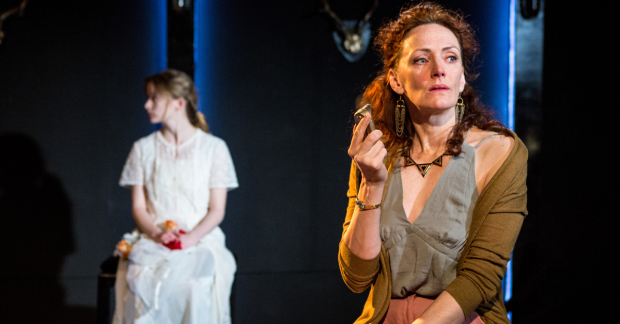The Iphigenia Quartet (Gate Theatre)
The classic Greek story of ”Iphigenia at Aulis” is reworked into four short plays

© Helen Murray
The thing about quartets, right, is that they play together. This one doesn't. The four short plays pulled together at the Gate, all revisions of and responses to Iphigenia at Aulis, end up pulling in different directions.
The Iphigenia myth is the precursor to The Oresteia. Agamemnon sacrifices his daughter to the Gods, recompense for shooting a sacred stag, to raise the winds that will blow his army to Troy. Having persuading Iphigenia to Aulis to marry the immortal Achilles, he gives her away to the Gods. In time, his wife Clytemnestra will avenge her daughter's death.
It is a tragedy with no right answers – no heroes, no villains – and the four shorts split our sympathies, each foregrounding one player's perspective. Caroline Bird puts the case for Agamemnon: a drunk army general, desperately hoping to avert his daughter's death, only to find his hands tied. Lulu Raczka wrangles with the idea of Clytemnestra as a feminist icon. Suhayla El-Bushra makes Iphigenia a sacrifical lion, charging at death out of duty and destiny, while Chris Thorpe, slyly, turns his gaze outwards, to a chorus of onlookers.
The Gate has form in rewiring the Greeks. It was here that Sarah Kane's slobby Hippolytus jacked off into a sock in Phaedra's Love. More recently, it staged Roland Schimmelpfennig's squabble over the story of Idomeneus. You can see the shoots of both seeds here: Bird and El-Bushra strain for contemporareity; Raczka and Thorpe wrestle with interpretation.
Those two are the most vital, partly because they don't try to compact the tragedy. Bird and El-Bushra give us Iphigenia in shot form – the first an apocalyptic action-filled epic; the second a wry, domestic update. Neither has the breathing space to build.
Better to approach from an angle. In Clytemnestra, Raczka pits a male film director against a female academic – one sexing up "Troy: the Trilogy" with a cold-blooded badass heroine ("think Uma Thurman – Kill Bill"); the other dissecting it coldly, seeing the feminist she wants to see. They're set against eye witnesses, a maid and a solider, as proof that myths are malleable.
Thorpe shows us the Chorus – four ordinary onlookers, standing in for the wider world and the chatter of online opinion. It's a sharp satire of our passive acceptance of a ruling elite, one we engage with as entertainment. They stare square-eyed into the distance, fixated by fame and stretching against stiffness, as they drop wrappers and litter onto the floor.
There is good stuff here, some of it great, but the format does the foursome no favours. Even if each telling is more important than the story itself, you're still watching that story on repeat. It slackens our watching: the details don't seem so sharp, the repetition tests your patience. The four plays undermine each other. One's scepticism eats another's sincerity.
The core idea is strong – Iphigenia four ways – but it needs a singularity of purpose that four playwrights and four directors just can't provide. Switches in style and tone put the whole thing on shuffle, and neither Cécile Trémolières's all-purpose design – naff as a nineties nightclub – nor Elena Peña's infuriating background noise can pull them together.
There are lively performances – Shannon Tarbet a wrathful wraith of an Iphigenia, Dwayne Walcott as a shrugging, chain-smoking immortal ("Fuck it"), Anthony Barclay as a caffeinated director – but ultimately, and fatally, it's never quite clear why Iphigenia merits close attention. If it's just the neatness of four by four by four, that feels academic.
The Iphigenia Quartet runs at the Gate Theatre until 21 May.












